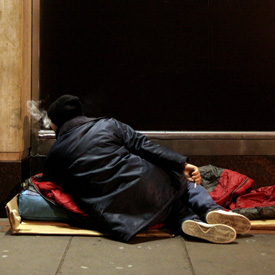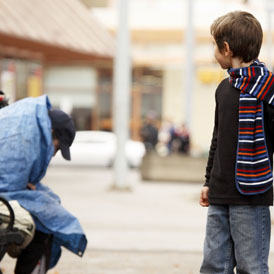The ‘new and unexpected breed’ of Britain’s homeless
 Jackie Long
Social Affairs Editor and Presenter
Jackie Long
Social Affairs Editor and Presenter
Exclusive: As austerity cuts continue to bite, Channel 4 News reveals the number of homeless people is surging. Social Affairs Editor Jackie Long finds a new type of homeless person is emerging.
The idea that former submariner, Ian, might find himself sleeping rough is so absurd as to be almost laughable.
He has what might be described as “military bearing”. He’s tall and proud and looks like I’m speaking a different language when I ask him why he doesn’t go on benefits and give himself a better chance of keeping a roof over his head?
“Why would I go on benefits when I can work?” he says.
But the problem is, Ian can’t get enough work. After his marriage broke up, he spent four years retraining as a lawyer.
The sum total of my monthly income at the moment from my three part-time jobs bring in a grand total of about £600 a month and the rent in the flat is £970 and you don’t need a PhD in mathematics to work out that’s not sustainable. Ian
He hasn’t been able to find a full-time job, and as he packs up his many things (this is a man who’s known good times) his explanation of why he’s moving out of his flat – when he has nowhere to move to – is a simple one. He can’t afford to pay the rent.
“The sum total of my monthly income at the moment from my three part-time jobs bring in a grand total of about £600 a month and the rent in the flat is £970 and you don’t need a PhD in mathematics to work out that’s not sustainable.”
So Ian has left his flat in Guildford, one of the most affluent places in the country, and moved into a tent in the Surrey countryside.
We watched him as he tried to maintain a normal life, going to his part-time job in the pub and continuing to look for work as a lawyer. He’s bullish and hopes it will only be temporary.

‘New type of homeless’
The last time rough sleeping was at the top of the political agenda was back in the eighties.
This time round there are no cardboard cities – yet.
But Channel 4 News has discovered it’s pulling in people and places barely touched before.
Not only are the numbers of rough sleepers spiralling but there is a new type of homeless person emerging out of the backwash of the recession.
Figures given exclusively to Channel 4 News by the umbrella group Homeless Link, reveal that of 200 homeless organisations they surveyed, 66 per cent reported a rise in the number of rough sleepers in their area.
At a direct access hostel in Crawley, those figures are no surprise to the manager, Peter Mansfield Clark. He’s grappling with some pretty difficult statistics of his own.
“In the last 12 months, we’ve had to turn away just over 1,900 people, and out of 1,900, almost 500 were women,” he explained.
“And we are having to say to people, ‘Sorry. We’re full and you’ve got to stay on the street.’ It’s a horrendous figure.”
Fall-out from recession
Peter says he too is seeing a new, unexpected breed of homeless people looking for help.
“We’re getting people who, if you like, are slightly higher up the social scale, who have been working for most of their lives. And things have gone wrong with them since the recession.”
Young Joe is typical. He seems bewildered as he looks back over the past six months and recalls how he went from full-time work and a nice flat with his girlfriend, to walking the streets looking for somewhere to stay.
“The work just didn’t come through,” he told me. “It got less and less, so I still had a job but there just wasn’t the hours or the amount of days. Not enough to keep me going properly and keep things sweet at home.”
‘Government has no idea’
Peter Mansfield Clark says he’s worried the Government has no idea of the scale of this growing problem – of people like Joe, whose fragile economies are tipping them over the edge and into crisis much more quickly than they might have done in the past.
At the heart of the issue – the figures themselves.
When the coalition first came to power it changed the way rough sleeper figures were collated, arguing that it gave a more accurate figure than in the past. So the 2011 official figure for rough sleepers across the country stands at 1,768.
But Channel 4 News surveyed 80 frontline homeless organisations and two-thirds of them told us that the figures “significantly underestimate” the numbers of people sleeping rough.
1n 2010, 189,000 people were put into temporary accommodation, such as B&Bs, to prevent them becoming homeless, up 14 per cent on the previous year
Also last year, 44,160 people were accepted as homeless by councils and put into social housing, up 10 per cent on previous year
630,000 households are now classed as “overcrowded” as families are forced to share a dwindling number of properties
Source: Crisis
A spokesman from the Department for Communities and Local Government said: “In September 2010 the Government overhauled the way local areas assess the number of people sleeping rough with the introduction of a more accurate assessment that provides a snapshot of the number of rough sleepers on a given night made up of street counts and robust estimates.
“Following a consultation the Government also expanded the definition of ‘rough sleeper’ which now includes those not yet bedded down, people in tents and more flexible times for the collection of data to take account of local circumstances.
“It is the responsibility of local authorities to provide accurate numbers. Street counts are independently verified by Homeless Link.
“We believe that this represents a significant improvement in the way local areas assess the number of people sleeping rough and provides a robust estimate of the number of rough sleepers on England’s streets based on information from every local authority.”

Austerity cuts bite
Charities are warning that the situation can only get worse – with changes to the benefit system seeing some safety nets slip away.
Homeless Link chief executive, Jenny Edwards, said: “It’s quite well known that homelessness kicks in quite late after a recession and we’re now seeing some of the results of that coming through.”
She went on: “At the same time we’re seeing some vulnerable people with mental health issues or disabilities who have relied on support in their accommodation and are finding that’s been cut back, so we’re seeing an increase in that area as well.”
But the Government maintains there is no reason why its welfare reforms would leave anyon homeless. The Department for Work and Pensions told Channel 4 News that the reforms are “about restoring fairness and sense to a system that has spiralled out of control and left communities trapped in a cycle of benefit dependency.
“We will support those who can work into work and make sure it pays to do so. Universal credit will lift almost one million people, including 350,000 children, out of poverty and restore the welfare system to its original purpose.”
-
Latest news
-
‘Authentic Stupidity’: Ben Elton’s new show explores how idiotic human beings can be5m

-
Is Israel’s evacuation of Rafah the precursor to full scale invasion?3m

-
Eurovision: Non-binary artist wins for first time2m

-
Tens of thousands march in Georgian capital against ‘foreign agents’ bill2m

-
‘Russia’s number one goal is to get troops closer to Kharkiv,’ says Ukrainian security analyst4m

-




